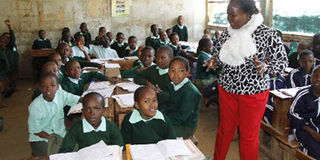Programme offers new ideas on class management, teaching methods

A teacher at work. A programme called Strengthening Education Systems in East Africa Project (SESEA) aims to train more than 1,000 pre-school and primary school teachers and head teachers in Mombasa, Kilifi and Kwale counties in class management, teaching methods, and education oriented technological innovation among other topics. FILE PHOTO / JEFF ANGOTE
What you need to know:
- Project co-funded by the Canadian Department of Foreign Affairs, Trade and Development (DFATD) and the Aga Khan Foundation at a cost of Sh2.4 billion
- Programme launched in 2013 in Uganda and is being applied in two teacher-training colleges for primary school teachers and 150 schools in the West Nile region
Mombasa Teachers Service Commission (TSC) director Ibrahim Rugut once said at a forum: “Teachers act as role models. Through mentorship, they shape the future career of their students.”
In a few years to come, more than 46,000 pupils in coastal Kenya will be putting to practice skills passed down to them by their teachers.
That’s the reason that a programme launched last year to impart advanced teaching skills to teachers recently received positive reviews as the first lot of the additionally trained teachers graduated.
The programme is named Strengthening Education Systems in East Africa Project (SESEA). It aims to train more than 1,000 pre-school and primary school teachers and head teachers in Mombasa, Kilifi and Kwale counties in class management, teaching methods, and education-oriented technological innovation among other topics.
Already, the first batch of SESEA beneficiaries — 26 head teachers and 36 teachers — graduated mid last month at the Aga Khan Academy in Mombasa after a two-year study.
PROFESSIONAL DEVELOPMENT
The certificates they were awarded are internationally recognised, meaning they can use them to secure a teaching job in any part of the world.
SESEA, which is a five-year project, aims to develop skilled and competent teachers at the pre-primary and primary levels through accredited professional development programmes.
The project is co-funded by the Canadian Department of Foreign Affairs, Trade and Development (DFATD) and the Aga Khan Foundation at a cost of Sh2.4 billion.
It specifically targets to train 720 pre-school teachers through the Madrassa Early Childhood Programme (MECP), and 204 schools and two Teacher Training Colleges (TTCs). The latter is through the Aga Khan Academy Professional Development Centre.
It also targets 303 pre-primary, primary teachers and education officers through Aga Khan University Institute for Educational Development (and 1200 teachers through Aga Khan Foundation school improvement programme.
FOCUSING ON PUPILS
Nelson Nabianga, one of the new graduates of the programme and who teaches English in Class Four and Six at Serani Primary school in Mombasa, said after the graduation: “Before the training, I had only the knowledge of general methodologies of teaching applicable to all subjects. But through the programme, I learned the specific methodology of teaching English."
“The learners are enjoying the subject more because three-quarters of learning, thanks to its methodology, is generated by them, unlike before when it would be generated by the teacher,” Mr Nabianga added.
SESEA project director Patrick Sikana said: “Our main focus is on the children. That child out there should be able to read and write and do basic numeracy competencies. We need better teachers, stronger institutions that produce trainers and better education policies.”
Head of Aga Khan Academy Simon Otieno said the desire to see Coast schools excelling academically like those in other regions drove them to the idea of improving the performance by boosting teacher training.
TECHNOLOGY BARRIERS
“The number one element that influences student outcomes is teacher quality. The number one element that influences teacher quality is professional development. We call it ‘Operation ondoa kutu’ (removing old-style teaching),” said Mr Otieno in an interview at his office.
“English is specifically a major problem in coast schools. We did a lot of work with teachers in that sector. We are also showing them new ideas and tricks of how to make children better understand mathematics,” Mr Otieno added.
Mr Rugut, the Mombasa TSC director, sees SESEA as a big boost to the commission, which is experiencing shortfalls in funding advancement courses for teachers in the country.
“The challenges are how to enable teachers not only to overcome the technology barriers, but also to empower them to integrate appropriate technologies into curriculum delivery, and thereby improve learning processes and outcomes,” he says.
SESEA, whose implementation began in April last year, is also being used in neighbouring Uganda.
There, the programme was launched in June 2013, and is being applied in two teacher-training colleges for primary school teachers and 150 schools in the West Nile region. It will soon be launched in Tanzania, according to the project director.





